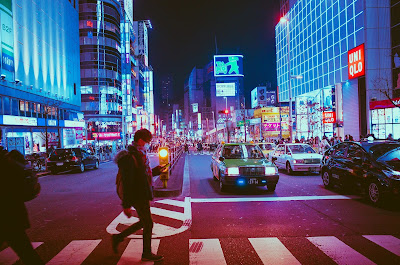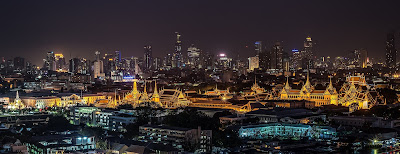Personal safety at night
- Get link
- X
- Other Apps
Personal safety at night is a serious concern for many people, especially those who live in cities or are out and about after dark. Threats to personal safety can come in many forms, including mugging, theft, sexual assault, harassment, physical assault, and road accidents. While it's not possible to completely eliminate the risk of danger, there are steps you can take to minimize your risk and protect yourself.
One of the most important steps you can take to stay safe at night is to stay alert and aware of your surroundings. This means staying alert and alerting to any potential threats, such as people or vehicles following you or approaching you too closely. It's also important to plan ahead, especially if you're going to be out late. Let someone know your plans and expected return time, and carry your cell phone with you at all times, making sure it's charged before you go out.
When it comes to physical safety, the best way to stay safe is to stick to well-lit routes, and avoid dark alleys and deserted areas. Trust your instincts; if you feel unsafe or uncomfortable in a particular area, it's best to leave and find a safer place. Additionally, it's important to keep your cell phone charged so you can call for help if needed.
If you're driving at night, there are additional steps you can take to stay safe. Keep your car windows and doors locked, avoid driving late at night, and keep your car in good condition, checking the brakes, tires, and lights regularly. Avoid distractions while driving, such as texting or eating, and keep your attention on the road at all times.
Self-defense is also an important part of personal safety at night. While it's always best to avoid confrontations, it's important to be prepared in case you're ever faced with a dangerous situation. There are several basic self-defense moves that can help you protect yourself, including striking vulnerable areas, using everyday objects as weapons, and yelling for help. Additionally, carrying self-defense tools, such as pepper spray, a personal alarm, or a taser, can give you an added layer of protection.
Personal safety at night is a serious concern for many people, and it's important to take steps to protect yourself. Staying alert and aware of your surroundings, using well-lit routes, and trusting your instincts can help minimize your risk of danger. Additionally, planning ahead, self-defense techniques, and carrying self-defense tools can give you an added layer of protection. Remember to prioritize your personal safety at night, and if you ever feel threatened or uncomfortable, don't hesitate to call for help.
Common threats to personal safety at night
Personal safety at night is a concern for many individuals, and with good reason. The risks associated with being out and about after dark can be significant and can come in many different forms. In this article, we will discuss some of the most common threats to personal safety at night, and what you can do to protect yourself.
Mugging and theft are two of the most common threats to personal safety at night. Muggers often prey on individuals who are walking alone, or in poorly lit areas, and they may use violence or the threat of violence to steal your valuables. To protect yourself from mugging, it's important to stay in well-lit areas, avoid walking alone, and keep a low profile by not carrying large amounts of cash or valuable items.
Sexual assault is another common threat to personal safety at night. This can occur anywhere, and perpetrators often prey on individuals who are alone or in isolated areas. To reduce your risk of sexual assault, it's important to be aware of your surroundings, avoid walking alone in deserted areas, and trust your instincts. If you feel uneasy or uncomfortable in a particular situation, it's best to leave and find a safer place.
Harassment is another concern for individuals who are out and about at night. This can include unwanted attention from strangers, such as catcalling, or physical harassment. To protect yourself from harassment, it's important to be aware of your surroundings, and to trust your instincts. If you feel uncomfortable or uneasy in a particular situation, it's best to leave and find a safer place. Additionally, it's a good idea to carry a personal alarm or pepper spray to help deter potential attackers.
Physical assault is another common threat to personal safety at night. This can include random attacks, assaults by acquaintances, or domestic violence. To protect yourself from physical assault, it's important to be aware of your surroundings, and to trust your instincts. Avoid walking alone in deserted areas, and carry a personal alarm or pepper spray to help deter potential attackers. Additionally, if you're in a domestic violence situation, it's important to seek help from a trusted friend, family member, or law enforcement agency.
Road accidents are another common threat to personal safety at night. Many accidents occur after dark, and the risks can be increased by poor visibility, fatigue, and the influence of alcohol or drugs. To protect yourself from road accidents, it's important to be a responsible driver. Avoid driving after consuming alcohol or drugs, and make sure you're well rested before getting behind the wheel. Additionally, it's important to be aware of your surroundings, and to always wear a seatbelt.
Tips for staying safe at night
Staying safe at night is a top priority for many individuals, and there are several simple steps you can take to minimize your risk of danger. In this article, we'll explore some tips for staying safe at night, so you can feel more confident and secure when you're out and about.
The first tip for staying safe at night is to be aware of your surroundings. Pay attention to what's going on around you, and look for any potential threats, such as dark alleys, deserted streets, or suspicious individuals. Additionally, avoid walking with your head down, as this can make you an easy target for muggers or other attackers.
Another important tip for staying safe at night is to avoid walking alone, especially in deserted or poorly lit areas. Instead, walk with a friend, or consider using public transportation, taxis, or ride-sharing services. If you must walk alone, try to stay in well-lit areas and avoid taking shortcuts through dark alleys or parks.
Another important step for staying safe at night is to trust your instincts. If you feel uneasy or uncomfortable in a particular situation, it's best to leave and find a safer place. Additionally, if you see something suspicious, don't hesitate to call the police or other authorities for assistance.
Another tip for staying safe at night is to carry a personal alarm or pepper spray. These items can be useful in deterring potential attackers and can help you get help quickly in an emergency situation. Personal alarms are especially useful, as they can make a loud noise to attract attention and alert others that you need help.
It's also important to take care when using your phone or other electronic devices when you're out at night. Avoid texting or talking on the phone while walking, as this can make you an easy target for muggers or other attackers. Additionally, avoid posting your location or other personal information online, as this can make you vulnerable to crime.
Another important step for staying safe at night is to stay sober and avoid drugs or excessive alcohol. Substance abuse can impair your judgment, slow your reaction times, and make you more vulnerable to crime. Additionally, if you're drunk, you may be more likely to become involved in a road accident, which can pose a serious threat to your safety.
It's important to have a plan for what to do in an emergency situation. This may include having the phone numbers for local authorities or emergency services programmed into your phone, or carrying a charged cell phone with you at all times. Additionally, you may consider taking a self-defense class, which can teach you how to defend yourself in a dangerous situation.
Self-defense techniques
Self-defense is an important skill to have, as it can help you protect yourself in dangerous situations. Whether you're facing a physical attack or an attempted mugging, knowing a few basic self-defense techniques can give you the confidence and knowledge you need to defend yourself.
One self-defense technique is to use pepper spray or another type of personal defense spray. Pepper spray is an easy-to-use, non-lethal weapon that can help you fend off an attacker by temporarily blinding and disabling them. Additionally, many pepper spray products also contain a dye that can help the police identify the attacker later.
Another common self-defense technique is to use your body weight and leverage to escape a dangerous situation. For example, if someone is trying to grab you, you can pivot your body and use your weight to pull away from their grip. Additionally, if someone is trying to push you, you can use your body weight to resist their force and maintain your balance.
Another effective self-defense technique is to know how to escape from common holds, such as chokeholds or bear hugs. This may include using leverage to break the hold.
Another important self-defense technique is to be aware of your surroundings at all times. This means paying attention to what's going on around you, and looking for any potential threats. Additionally, you can minimize your risk of danger by avoiding dark alleys, deserted streets, or other areas that may be unsafe.
Another important self-defense technique is to carry a personal alarm or whistle, which can help you attract attention and alert others if you're in danger. Personal alarms are especially useful, as they can make a loud noise that can scare off an attacker and attract attention from others.
It's also important to take care when using your phone or other electronic devices when you're out and about. Avoid texting or talking on the phone while walking, as this can make you an easy target for muggers or other attackers. Additionally, avoid posting your location or other personal information online, as this can make you vulnerable to crime.
It's also important to have a plan for what to do in an emergency situation. This may include having the phone numbers for local authorities or emergency services programmed into your phone, or carrying a charged cell phone with you at all times.
- Get link
- X
- Other Apps


